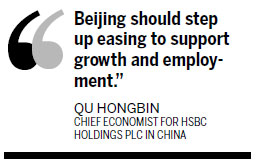Slowdown worsens in emerging markets as orders drop
Updated: 2012-10-11 10:13
By Chen Jia (China Daily)
|
|||||||||||
The slowdown in emerging markets worsened in the third quarter as manufacturing output slackened amid decreasing orders in developed economies, HSBC Holdings Plc said on Wednesday.
The economies of China and Brazil weakened the most among emerging market countries, according to the bank.
 |
The bank's emerging market index, which measures production and business activity in the manufacturing and service sectors, fell to 52.1 during the July-to-September period, down from the 53.2 in the second quarter.
HSBC conducted 23 surveys across 18 emerging market economies to create the economic indicator. A reading above 50 indicates expansion, while one below 50 shows contraction.
Murat Ulgen, HSBC chief economist, central and eastern Europe and sub-Saharan Africa, said: "Emerging economies are being affected by the misery of the developed world."
In the third quarter, the manufacturing sectors of major developing economies have experienced rapid deterioration while service industries have been able to sustain expansion, but at the weakest rate in a year, according to an HSBC report based on the surveys.
Chinese economic growth has been the biggest concern of global investors since a serious economic cooling down period began at the end of last year.
Worse-than-expected economic deceleration may see an end to China's period of "double-digit GDP growth", economists said.
The world's second largest economy's manufacturing Purchasing Managers' Index rebounded slightly in September to 49.8 from 49.2 in August, its lowest level since November 2011, showing that the sector was still contracted according to data from the National Bureau of Statistics.
The service sector expanded, but at a slowing pace in September. The indicator dropped to 53.7 from 56.3 in August.
"Beijing should step up easing to support growth and employment," said Qu Hongbin, HSBC's chief economist in China.
There remains space for policy easing, especially in terms of fiscal measures, he said.
According to HSBC, in the three months to September, manufacturing output fell on weak demand from developed economies and new orders declined in 11 out of 18 economies surveyed.
During the same period, the service sector in emerging markets dropped to its weakest level since 2005, marking a sharp contrast with the previous quarter when service providers were at their most optimistic for two years.
The International Monetary Fund lowered the 2012 and 2013 growth expectations for the major emerging economies, including China and Brazil.
However, these economies will remain relatively fast-growing after the financial crisis and be the engines of global economic growth, it said.
chenjia1@chinadaily.com.cn
Today's Top News
President Xi confident in recovery from quake
H7N9 update: 104 cases, 21 deaths
Telecom workers restore links
Coal mine blast kills 18 in Jilin
Intl scholarship puts China on the map
More bird flu patients discharged
Gold loses sheen, but still a safe bet
US 'turns blind eye to human rights'
Hot Topics
Lunar probe , China growth forecasts, Emission rules get tougher, China seen through 'colored lens', International board,
Editor's Picks

|

|

|

|

|

|





